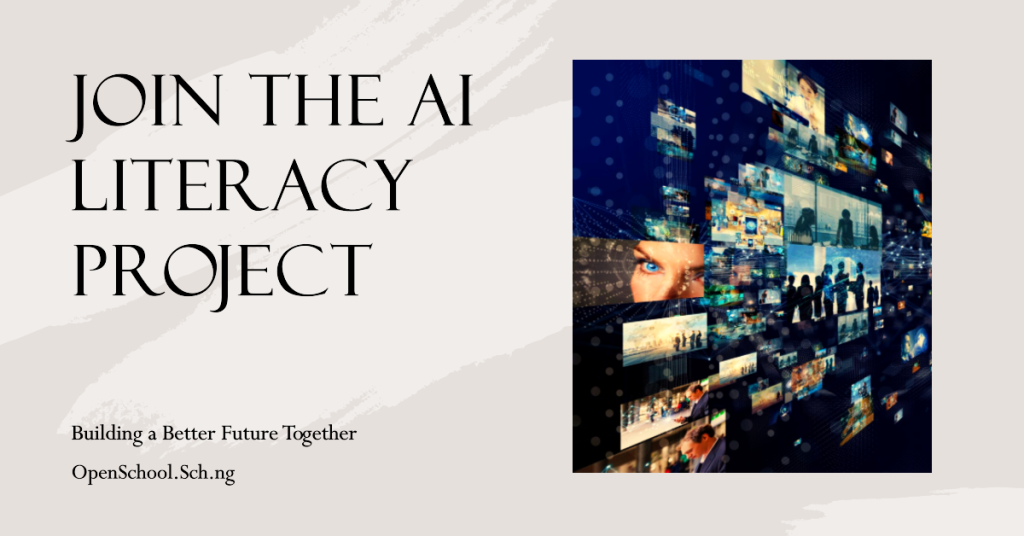Introduction
Imagine a world where “seeing is no longer believing.” A world where anyone can create and spread fake or altered content that can ruin reputations, incite violence, or manipulate opinions. This is the world we live in today. Nigeria is especially vulnerable to this threat. With its large and engaged social media population, the country is a prime target for deep fakes. Deepfakes are synthetic media that use artificial intelligence to manipulate or replace existing images, audio, or videos with new content. This can be used to create fake news, spread misinformation, or even impersonate public figures.
Our AI Digital Literacy Campaign is a two-year initiative to help Nigerians learn how to identify and combat deepfakes. By arming Nigerians with the knowledge and skills to discern and combat deepfakes, we aim to foster digital literacy and responsible AI usage. Through this empowering initiative, we can safeguard Nigerian citizens while unleashing the true potential of AI for positive transformations. This campaign will be delivered through various channels, including online courses, workshops, and public awareness events.
The AI Digital Literacy Campaign is an essential investment in the future of Nigeria. By helping Nigerians become more digitally literate, we can ensure that the country is included in the age of AI.
Problem
Nigeria’s high social media use and vulnerable population make it an attractive target for deep-fakes manipulation. The spread of deepfakes poses serious risks, including the potential for misinformation dissemination, reputational harm, and societal unrest. Educating individuals on deepfake identification, verification, and counteraction is crucial to safeguarding the nation’s well-being.
Solution
Our AI Digital Literacy Campaign will be implemented in three phases, each targeting key stakeholders:
Phase 1: Awareness-Raising Workshops: Workshops will educate religious leaders, law enforcement/security agencies, journalists, civil society organisations, judges, and higher education students about deepfakes and how to identify them, creating a ripple effect of awareness and responsible AI usage. As such, this phase targets major stakeholders, the population most likely at risk of becoming victims of deep fakes and the youth that uses social media the most.
Phase 2: Training on Deepfake Verification and Counteraction: Online and in-person training to teach participants how to detect deepfakes and develop critical thinking skills to combat the spread of misinformation.
Phase 3: Advocacy Events for Action: Advocacy events will raise awareness about deepfakes and urge stakeholders to take action. We will also collaborate with legal and policy-making bodies to establish a robust framework for addressing deepfakes.
Impact and Metrics
The Campaign aims to train at least 50,000 people in deepfake identification, verification, and counteraction techniques. It also aims to reduce the number of deep fake incidents reported and shared on social media platforms by 30% and to increase public awareness of deep fakes and the perception of AI as a tool for both positive and negative purposes. The campaign will also collaborate with legal and policy-making bodies to establish guidelines, legislation, or regulations to combat deepfakes effectively and address their potential legal implications.
Funding Request
The Campaign is a $500,000 initiative to raise awareness of deepfakes and train people to identify and counter them. The campaign will organise workshops, develop online courses, host advocacy events, conduct surveys, engage with technology experts, and cover staff salaries, travel expenses, equipment, and a contingency fund. Furthermore, the campaign will utilise social media, radio, television, SMS, and emails to ensure a broader outreach. By raising awareness and training people on how to identify and counter deep fakes, the campaign will help protect individuals and societies from the harm of this technology. Link for a detailed budget here.
Monitoring and Evaluation Strategy
The campaign will be evaluated on key metrics such as the number of people trained in deep fake identification, the reduction in the number of profound fake incidents reported on social media, the increase in public awareness of deep fakes, and the development of guidelines to combat deep fakes. The campaign will use quantitative and qualitative methods, including surveys, social media monitoring, focus groups, and engagement with legal bodies.
In addition to the key metrics, the campaign will collect data on participant demographics, their level of interest in AI, their understanding of its potential benefits and risks, and their attitudes towards its use in society. This data will be used to understand the campaign’s impact better and inform future initiatives to promote digital literacy and responsible AI usage in Nigeria.
Sustainability Plan
Our Campaign will have a lasting impact beyond the funding period through a number of strategic measures, such as establishing a network of AI ambassadors, developing comprehensive online courses and materials, collaborating with key stakeholders, exploring revenue generation, and documenting and sharing best practices. These measures will ensure that the campaign has a lasting impact on the global community and helps to build a more responsible AI ecosystem.
Call to Action
We urge you to support the AI Digital Literacy Campaign to combat deepfakes in Nigeria. By contributing to this vital cause, you will help protect individuals from the harms of deepfakes, foster responsible AI usage, and contribute to a safer digital environment. Together, we can make a lasting impact and pave the way for a future where technology is harnessed for the greater good.
Contact Information
If you want to learn more about the campaign or donate, please get in touch with us at campaign@openschool.sch.ng. Your support is invaluable in creating a secure and informed Nigeria.
Thank you for your consideration and support.

